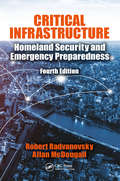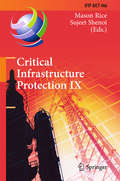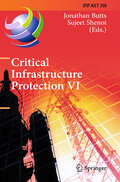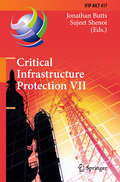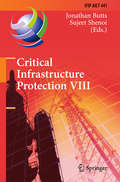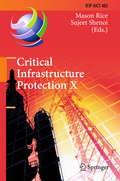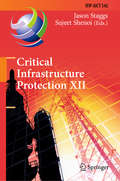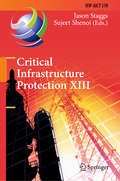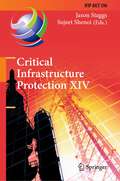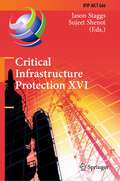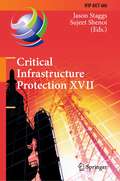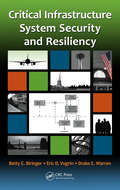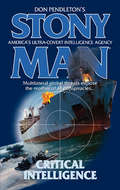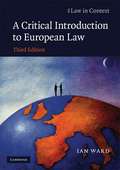- Table View
- List View
Critical Infrastructure: Homeland Security and Emergency Preparedness, Fourth Edition
by Robert S. Radvanovsky Allan McDougallThis edition of Critical Infrastructure presents a culmination of ongoing research and real-work experience, building upon previous editions. Since the first edition of this work, the domain has seen significant evolutions in terms of operational needs, environmental challenges and threats – both emerging and evolving. This work expands upon the previous works and maintains its focus on those efforts vital to securing the safety and security of populations. The world continues to see a shift from a force-protection model to one more focused on resilience. This process has been exacerbated and challenged as societies face increased instability in weather and arguably climate, a destabilized geopolitical situation, and continuing economic instability. Various levels—ranging from international oversight to individual actions—continue to work towards new approaches and tools that can assist in meeting this challenge. This work keeps pace with the key changes that have occurred since previous editions and continues to provide insight into emerging and potential issues. Expanding from historical research, major areas of interest such as climate change, regulatory oversight, and internal capacity building are explored. This work provides a reference for those that are working to prepare themselves and their organizations for challenges likely to arise over the next decade. In keeping with the fast-changing nature of this field, Critical Infrastructure: Homeland Security and Emergency Preparedness, Fourth Edition has been completely revised and fully updated to reflect this shift in focus and to incorporate the latest developments. Presents an overview of some of the emerging challenges and conflicts between the public and private sector; Continues to build the case for organizations to adopt an intelligence-driven and adaptive approach to protecting infrastructure; Presents a unique and new perspective of re-examining baseline requirements against a range of shifting factors, taking a balanced approach between risk-based planning and consequence management; Expands upon the issue of internal and lone-wolf threats that pose additional challenges to a system that continues to focus largely on external threats; and An enhanced and improved view of interdependencies in an increasingly inter-connected and network-enabled world. Preparing for the challenges of increasingly unstable threat and operating environments will pose challenges at all levels. Those involved in ensuring that critical infrastructure protection and assurance efforts function effectively and efficiently—whether as government regulators, business operators, clients of various infrastructure sectors or those seeking to maintain an accountable system – will find insights into less-explored aspects of this challenging field.
Critical Infrastructure Protection IX: 9th IFIP 11.10 International Conference, ICCIP 2015, Arlington, VA, USA, March 16-18, 2015, Revised Selected Papers (IFIP Advances in Information and Communication Technology #466)
by Mason Rice Sujeet ShenoiThe information infrastructure---comprising computers, embedded devices, networks and software systems---is vital to day-to-day operations in every sector: information and telecommunications, banking and finance, energy, chemicals and hazardous materials, agriculture, food, water, public health, emergency services, transportation, postal and shipping, government and defense. Global business and industry, governments, indeed society itself, cannot function effectively if major components of the critical information infrastructure are degraded, disabled or destroyed. Critical Infrastructure Protection describes original research results and innovative applications in the interdisciplinary field of critical infrastructure protection. Also, it highlights the importance of weaving science, technology and policy in crafting sophisticated, yet practical, solutions that will help secure information, computer and network assets in the various critical infrastructure sectors. Areas of coverage include: Themes and Issues, Control Systems Security, Cyber-Physical Systems Security, Infrastructure Security, Infrastructure Modeling and Simulation, Risk and Impact Assessment. This book is the ninth volume in the annual series produced by the International Federation for Information Processing (IFIP) Working Group 11.10 on Critical Infrastructure Protection, an international community of scientists, engineers, practitioners and policy makers dedicated to advancing research, development and implementation efforts focused on infrastructure protection. The book contains a selection of nineteen edited papers from the Ninth Annual IFIP WG 11.10 International Conference on Critical Infrastructure Protection, held at SRI International, Arlington, Virginia, USA in the spring of 2015. Critical Infrastructure Protection IX is an important resource for researchers, faculty members and graduate students, as well as for policy makers, practitioners and other individuals with interests in homeland security. Mason Rice is an Assistant Professor of Computer Science at the Air Force Institute of Technology, Wright-Patterson Air Force Base, Ohio, USA. Sujeet Shenoi is the F.P. Walter Professor of Computer Science and a Professor of Chemical Engineering at the University of Tulsa, Tulsa, Oklahoma, USA.
Critical Infrastructure Protection VI: 6th IFIP WG 11.10 International Conference, ICCIP 2012, Washington, DC, USA, March 19-21, 2012, Revised Selected Papers (IFIP Advances in Information and Communication Technology #390)
by Jonathan Butts Sujeet ShenoiThe information infrastructure - comprising computers, embedded devices, networks and software systems - is vital to day-to-day operations in every sector: information and telecommunications, banking and finance, energy, chemicals and hazardous materials, agriculture, food, water, public health, emergency services, transportation, postal and shipping, government and defense. Global business and industry, governments, indeed society itself, cannot function effectively if major components of the critical information infrastructure are degraded, disabled or destroyed. Critical Infrastructure Protection VI describes original research results and innovative applications in the interdisciplinary field of critical infrastructure protection. Also, it highlights the importance of weaving science, technology and policy in crafting sophisticated, yet practical, solutions that will help secure information, computer and network assets in the various critical infrastructure sectors. Areas of coverage includes: Themes and Issues; Control Systems Security; Infrastructure Security; and Infrastructure Modeling and Simulation. This book is the sixth volume in the annual series produced by the International Federation for Information Processing (IFIP) Working Group 11.10 on Critical Infrastructure Protection, an international community of scientists, engineers, practitioners and policy makers dedicated to advancing research, development and implementation efforts focused on infrastructure protection. The book contains a selection of sixteen edited papers from the Sixth Annual IFIP WG 11.10 International Conference on Critical Infrastructure Protection, held at the National Defense University, Washington, DC, USA in the spring of 2011. Critical Infrastructure Protection VI is an important resource for researchers, faculty members and graduate students, as well as for policy makers, practitioners and other individuals with interests in homeland security. Jonathan Butts is an Assistant Professor of Computer Science at the Air Force Institute of Technology, Wright-Patterson Air Force Base, Ohio, USA. Sujeet Shenoi is the F.P. Walter Professor of Computer Science and a Professor of Chemical Engineering at the University of Tulsa, Tulsa, Oklahoma, USA.
Critical Infrastructure Protection VII: 7th IFIP WG 11.10 International Conference, ICCIP 2013, Washington, DC, USA, March 18-20, 2013, Revised Selected Papers (IFIP Advances in Information and Communication Technology #417)
by Jonathan Butts Sujeet ShenoiThe information infrastructure - comprising computers, embedded devices, networks and software systems - is vital to day-to-day operations in every sector: information and telecommunications, banking and finance, energy, chemicals and hazardous materials, agriculture, food, water, public health, emergency services, transportation, postal and shipping, government and defense. Global business and industry, governments, indeed society itself, cannot function effectively if major components of the critical information infrastructure are degraded, disabled or destroyed. Critical Infrastructure Protection VII describes original research results and innovative applications in the interdisciplinary field of critical infrastructure protection. Also, it highlights the importance of weaving science, technology and policy in crafting sophisticated, yet practical, solutions that will help secure information, computer and network assets in the various critical infrastructure sectors. Areas of coverage include: themes and issues; control systems security; infrastructure security; infrastructure modeling and simulation; and risk assessment. This book is the seventh volume in the annual series produced by the International Federation for Information Processing (IFIP) Working Group 11.10 on Critical Infrastructure Protection, an international community of scientists, engineers, practitioners and policy makers dedicated to advancing research, development and implementation efforts focused on infrastructure protection. The book contains a selection of fifteen edited papers from the Seventh Annual IFIP WG 11.10 International Conference on Critical Infrastructure Protection, held at George Washington University, Washington, DC, USA in the spring of 2013. Critical Infrastructure Protection VII is an important resource for researchers, faculty members and graduate students, as well as for policy makers, practitioners and other individuals with interests in homeland security. Jonathan Butts is an Assistant Professor of Computer Science at the Air Force Institute of Technology, Wright-Patterson Air Force Base, Ohio, USA. Sujeet Shenoi is the F.P. Walter Professor of Computer Science and a Professor of Chemical Engineering at the University of Tulsa, Tulsa, Oklahoma, USA.
Critical Infrastructure Protection VIII: 8th IFIP WG 11.10 International Conference, ICCIP 2014, Arlington, VA, USA, March 17-19, 2014, Revised Selected Papers (IFIP Advances in Information and Communication Technology #441)
by Jonathan Butts Sujeet ShenoiThe information infrastructure - comprising computers, embedded devices, networks and software systems - is vital to day-to-day operations in every sector: information and telecommunications, banking and finance, energy, chemicals and hazardous materials, agriculture, food, water, public health, emergency services, transportation, postal and shipping, government and defense. Global business and industry, governments, indeed society itself, cannot function effectively if major components of the critical information infrastructure are degraded, disabled or destroyed. Critical Infrastructure Protection VIII describes original research results and innovative applications in the interdisciplinary field of critical infrastructure protection. Also, it highlights the importance of weaving science, technology and policy in crafting sophisticated, yet practical, solutions that will help secure information, computer and network assets in the various critical infrastructure sectors. Areas of coverage include: control systems security, infrastructure security, infrastructure modeling and simulation, risk and impact assessment, and advanced techniques. This book is the eighth volume in the annual series produced by the International Federation for Information Processing (IFIP) Working Group 11.10 on Critical Infrastructure Protection, an international community of scientists, engineers, practitioners and policy makers dedicated to advancing research, development and implementation efforts focused on infrastructure protection. The book contains a selection of seventeen edited papers from the 8th Annual IFIP WG 11.10 International Conference on Critical Infrastructure Protection, held at SRI International, Arlington, Virginia, DC, USA in the spring of 2014. Critical Infrastructure Protection VIII is an important resource for researchers, faculty members and graduate students, as well as for policy makers, practitioners and other individuals with interests in homeland security.
Critical Infrastructure Protection X: 10th IFIP WG 11.10 International Conference, ICCIP 2016, Arlington, VA, USA, March 14-16, 2016, Revised Selected Papers (IFIP Advances in Information and Communication Technology #485)
The information infrastructure - comprising computers, embedded devices, networks and software systems - is vital to day-to-day operations in every sector: information and telecommunications, banking and finance, energy, chemicals and hazardous materials, agriculture, food, water, public health, emergency services, transportation, postal and shipping, government and defense. Global business and industry, governments, indeed society itself, cannot function effectively if major components of the critical information infrastructure are degraded, disabled or destroyed. Critical Infrastructure Protection describes original research results and innovative applications in the interdisciplinary field of critical infrastructure protection. Also, it highlights the importance of weaving science, technology and policy in crafting sophisticated, yet practical, solutions that will help secure information, computer and network assets in the various critical infrastructure sectors. Areas of coverage include: themes and issues; control systems security; infrastructure modeling and simulation; risk and impact assessment. This book is the tenth volume in the annual series produced by the International Federation for Information Processing (IFIP) Working Group 11.10 on Critical Infrastructure Protection, an international community of scientists, engineers, practitioners and policy makers dedicated to advancing research, development and implementation efforts focused on infrastructure protection. The book contains a selection of fourteen edited papers from the Tenth Annual IFIP WG 11.10 International Conference on Critical Infrastructure Protection, held at SRI International, Arlington, Virginia, USA in the spring of 2016. Critical Infrastructure Protection is an important resource for researchers, faculty members and graduate students, as well as for policy makers, practitioners and other individuals with interests in homeland security.
Critical Infrastructure Protection XII: 12th IFIP WG 11.10 International Conference, ICCIP 2018, Arlington, VA, USA, March 12-14, 2018, Revised Selected Papers (IFIP Advances in Information and Communication Technology #542)
by Jason Staggs Sujeet ShenoiThe information infrastructure – comprising computers, embedded devices, networks and software systems – is vital to operations in every sector: chemicals, commercial facilities, communications, critical manufacturing, dams, defense industrial base, emergency services, energy, financial services, food and agriculture, government facilities, healthcare and public health, information technology, nuclear reactors, materials and waste, transportation systems, and water and wastewater systems. Global business and industry, governments, indeed society itself, cannot function if major components of the critical information infrastructure are degraded, disabled or destroyed. Critical Infrastructure Protection XII describes original research results and innovative applications in the interdisciplinary field of critical infrastructure protection. Also, it highlights the importance of weaving science, technology and policy in crafting sophisticated, yet practical, solutions that will help secure information, computer and network assets in the various critical infrastructure sectors. Areas of coverage include: Themes and Issues; Infrastructure Protection; Infrastructure Modeling and Simulation; Industrial Control Systems Security. This book is the twelfth volume in the annual series produced by the International Federation for Information Processing (IFIP) Working Group 11.10 on Critical Infrastructure Protection, an international community of scientists, engineers, practitioners and policy makers dedicated to advancing research, development and implementation efforts focused on infrastructure protection. The book contains a selection of fifteen edited papers from the Twelfth Annual IFIP WG 11.10 International Conference on Critical Infrastructure Protection, held at SRI International, Arlington, Virginia, USA in the spring of 2018. Critical Infrastructure Protection XII is an important resource for researchers, faculty members and graduate students, as well as for policy makers, practitioners and other individuals with interests in homeland security.
Critical Infrastructure Protection XIII: 13th IFIP WG 11.10 International Conference, ICCIP 2019, Arlington, VA, USA, March 11–12, 2019, Revised Selected Papers (IFIP Advances in Information and Communication Technology #570)
The information infrastructure – comprising computers, embedded devices, networks and software systems – is vital to operations in every sector: chemicals, commercial facilities, communications, critical manufacturing, dams, defense industrial base, emergency services, energy, financial services, food and agriculture, government facilities, healthcare and public health, information technology, nuclear reactors, materials and waste, transportation systems, and water and wastewater systems. Global business and industry, governments, indeed society itself, cannot function if major components of the critical information infrastructure are degraded, disabled or destroyed. Critical Infrastructure Protection XIII describes original research results and innovative applications in the interdisciplinary field of critical infrastructure protection. Also, it highlights the importance of weaving science, technology and policy in crafting sophisticated, yet practical, solutions that will help secure information, computer and network assets in the various critical infrastructure sectors. Areas of coverage include: Themes and Issues; Infrastructure Protection; Vehicle Infrastructure Security; Telecommunications Infrastructure Security; Cyber-Physical Systems Security; and Industrial Control Systems Security. This book is the thirteenth volume in the annual series produced by the International Federation for Information Processing (IFIP) Working Group 11.10 on Critical Infrastructure Protection, an international community of scientists, engineers, practitioners and policy makers dedicated to advancing research, development and implementation efforts focused on infrastructure protection. The book contains a selection of sixteen edited papers from the Thirteenth Annual IFIP WG 11.10 International Conference on Critical Infrastructure Protection, held at SRI International, Arlington, Virginia, USA in the spring of 2019. Critical Infrastructure Protection XIII is an important resource for researchers, faculty members and graduate students, as well as for policy makers, practitioners and other individuals with interests in homeland security.
Critical Infrastructure Protection XIV: 14th IFIP WG 11.10 International Conference, ICCIP 2020, Arlington, VA, USA, March 16–17, 2020, Revised Selected Papers (IFIP Advances in Information and Communication Technology #596)
The information infrastructure – comprising computers, embedded devices, networks and software systems – is vital to operations in every sector: chemicals, commercial facilities, communications, critical manufacturing, dams, defense industrial base, emergency services, energy, financial services, food and agriculture, government facilities, healthcare and public health, information technology, nuclear reactors, materials and waste, transportation systems, and water and wastewater systems. Global business and industry, governments, indeed society itself, cannot function if major components of the critical information infrastructure are degraded, disabled or destroyed.Critical Infrastructure Protection XIV describes original research results and innovative applications in the interdisciplinary field of critical infrastructure protection. Also, it highlights the importance of weaving science, technology and policy in crafting sophisticated, yet practical, solutions that will help secure information, computer and network assets in the various critical infrastructure sectors. Areas of coverage include: Aviation Infrastructure Security; Vehicle Infrastructure Security; Telecommunications Systems Security; Industrial Control Systems Security; Cyber-Physical Systems Security; and Infrastructure Modeling and Simulation. This book is the fourteenth volume in the annual series produced by the International Federation for Information Processing (IFIP) Working Group 11.10 on Critical Infrastructure Protection, an international community of scientists, engineers, practitioners and policy makers dedicated to advancing research, development and implementation efforts focused on infrastructure protection. The book contains a selection of sixteen edited papers from the Fourteenth Annual IFIP WG 11.10 International Conference on Critical Infrastructure Protection, held at SRI International, Arlington, Virginia, USA in the spring of 2020. Critical Infrastructure Protection XIV is an important resource for researchers, faculty members and graduate students, as well as for policy makers, practitioners and other individuals with interests in homeland security.
Critical Infrastructure Protection XVI: 16th IFIP WG 11.10 International Conference, ICCIP 2022, Virtual Event, March 14–15, 2022, Revised Selected Papers (IFIP Advances in Information and Communication Technology #666)
The information infrastructure – comprising computers, embedded devices, networks and software systems – is vital to operations in every sector: chemicals, commercial facilities, communications, critical manufacturing, dams, defense industrial base, emergency services, energy, financial services, food and agriculture, government facilities, healthcare and public health, information technology, nuclear reactors, materials and waste, transportation systems, and water and wastewater systems. Global business and industry, governments, indeed society itself, cannot function if major components of the critical information infrastructure are degraded, disabled or destroyed.Critical Infrastructure Protection XVI describes original research results and innovative applications in the interdisciplinary field of critical infrastructure protection. Also, it highlights the importance of weaving science, technology and policy in crafting sophisticated, yet practical, solutions that will help secure information, computer and network assets in the various critical infrastructure sectors. Areas of coverage include: Industrial Control Systems Security; Telecommunications Systems Security; Infrastructure Security.This book is the 16th volume in the annual series produced by the International Federation for Information Processing (IFIP) Working Group 11.10 on Critical Infrastructure Protection, an international community of scientists, engineers, practitioners and policy makers dedicated to advancing research, development and implementation efforts focused on infrastructure protection. The book contains a selection of 11 edited papers from the Fifteenth Annual IFIP WG 11.10 International Conference on Critical Infrastructure Protection, held as a virtual event during March, 2022.Critical Infrastructure Protection XVI is an important resource for researchers, faculty members and graduate students, as well as for policy makers, practitioners and other individuals with interests in homeland security.
Critical Infrastructure Protection XVII: 17th IFIP WG 11.10 International Conference, ICCIP 2023, Arlington, VA, USA, March 13–14, 2023, Revised Selected Papers (IFIP Advances in Information and Communication Technology #686)
by Jason Staggs Sujeet ShenoiThe information infrastructure – comprising computers, embedded devices, networks and software systems – is vital to operations in every sector: chemicals, commercial facilities, communications, critical manufacturing, dams, defense industrial base, emergency services, energy, financial services, food and agriculture, government facilities, healthcare and public health, information technology, nuclear reactors, materials and waste, transportation systems, and water and wastewater systems. Global business and industry, governments, indeed society itself, cannot function if major components of the critical information infrastructure are degraded, disabled or destroyed. Critical Infrastructure Protection XVII describes original research results and innovative applications in the interdisciplinary field of critical infrastructure protection. Also, it highlights the importance of weaving science, technology and policy in crafting sophisticated, yet practical, solutions that will help secure information, computer and network assets in the various critical infrastructure sectors. Areas of coverage include: Themes and IssuesSmart Grid Risks and ImpactsNetwork and Telecommunications Systems SecurityInfrastructure SecurityAutomobile Security This book is the seventeenth volume in the annual series produced by the International Federation for Information Processing (IFIP) Working Group 11.10 on Critical Infrastructure Protection, an international community of scientists, engineers, practitioners and policy makers dedicated to advancing research, development and implementation efforts focused on infrastructure protection. The book contains a selection of eleven edited papers from the Seventeenth Annual IFIP WG 11.10 International Conference on Critical Infrastructure Protection, which was held at SRI International, Arlington, Virginia, USA in the spring of 2023. Critical Infrastructure Protection XVII is an important resource for researchers, faculty members and graduate students, as well as for as well as for policy makers, practitioners and other individuals with interests in homeland security.
Critical Infrastructure System Security and Resiliency
by Betty Biringer Eric Vugrin Drake WarrenSecurity protections for critical infrastructure nodes are intended to minimize the risks resulting from an initiating event, whether it is an intentional malevolent act or a natural hazard. With an emphasis on protecting an infrastructure's ability to perform its mission or function, Critical Infrastructure System Security and Resiliency presents
Critical Intelligence
by Don PendletonOperating under covert presidential directive, the clandestine antiterrorist organization Stony Man doesn't officially exist. Unofficially, they fight the fires bureaucracy can't or won't touch.
A Critical Introduction To European Law (PDF)
by Ian WardWritten by one of the leading academics specialising in European law and legal theory, A Critical Introduction to European Law explains the history and institutional framework of European Union law to students and scholars. Through the inclusion of commentaries on successive drafts of the Constitutional and Lisbon treaties, and discussion of recent developments such as the Turkish application, this third edition explores the evolving role of the EU in international and global politics. A consciously interdisciplinary approach, which draws on a variety of materials from political and legal thought, social theory, economic analysis, literature, history and cultural studies, is deployed to make the present state of Union law comprehensible.
Critical Introduction to Law
by Wade Mansell Belinda Meteyard Alan ThomsonThis book challenges the usual introductions to the study of law. It argues that law is inherently political and reflects the interests of the few even while presenting itself as neutral. It considers law as ideology and as politics, and critically assesses its contribution to the creation and maintenance of a globalized and capitalist world. The clarity of the arguments are admirably suited to provoking discussions of the role of law in our contemporary world. This third edition provides contemporary examples to sustain the arguments in their relevance to the twenty-first century. The book includes an analysis of the common sense of law; the use of anthropological examples to gain external perspectives of our use and understanding of law; a consideration of central legal concepts, such as order, rules, property, dispute resolution, legitimation and the rule of law; an examination of the role of law in women's subordination and finally a critique of the effect of our understanding of law upon the wider world. This book is ideal for undergraduate and postgraduate students reading law.
Critical Introduction to Law
by Wade Mansell Belinda Meteyard Alan ThomsonThis book challenges the usual introductions to the study of law. It argues that law is inherently political and reflects the interests of the few even while presenting itself as neutral. It considers law as ideology and as politics, and critically assesses its contribution to the creation and maintenance of a globalized and capitalist world. The clarity of the arguments are admirably suited to provoking discussions of the role of law in our contemporary world. This third edition provides contemporary examples to sustain the arguments in their relevance to the twenty-first century. The book includes an analysis of the common sense of law; the use of anthropological examples to gain external perspectives of our use and understanding of law; a consideration of central legal concepts, such as order, rules, property, dispute resolution, legitimation and the rule of law; an examination of the role of law in women's subordination and finally a critique of the effect of our understanding of law upon the wider world. This book is ideal for undergraduate and postgraduate students reading law.
A Critical Introduction to Law
by Wade Mansell Belinda Meteyard Alan ThomsonChallenging the usual introductions to the study of law, A Critical Introduction to Law argues that law is inherently political and reflects the interests of the few even while presenting itself as neutral. This fully revised and updated fourth edition provides contemporary examples to demonstrate the relevance of these arguments in the twenty-first century. The book includes an analysis of the common sense of law; the use of anthropological examples to gain external perspectives of our use and understanding of law; a consideration of central legal concepts, such as order, rules, property, dispute resolution, legitimation and the rule of law; an examination of the role of law in women's subordination and finally a critique of the effect of our understanding of law upon the wider world. Clearly written and admirably suited to provoking discussions on the role of law in our contemporary world, this book is ideal for undergraduate and postgraduate students reading law, and will be of interest to those studying legal systems and skills courses, jurisprudence courses, and law and society.
A Critical Introduction to Law
by Wade Mansell Belinda Meteyard Alan ThomsonChallenging the usual introductions to the study of law, A Critical Introduction to Law argues that law is inherently political and reflects the interests of the few even while presenting itself as neutral. This fully revised and updated fourth edition provides contemporary examples to demonstrate the relevance of these arguments in the twenty-first century. The book includes an analysis of the common sense of law; the use of anthropological examples to gain external perspectives of our use and understanding of law; a consideration of central legal concepts, such as order, rules, property, dispute resolution, legitimation and the rule of law; an examination of the role of law in women's subordination and finally a critique of the effect of our understanding of law upon the wider world. Clearly written and admirably suited to provoking discussions on the role of law in our contemporary world, this book is ideal for undergraduate and postgraduate students reading law, and will be of interest to those studying legal systems and skills courses, jurisprudence courses, and law and society.
A Critical Introduction to the Ethics of Abortion: Understanding the Moral Arguments
by Bernie CantensA Critical Introduction to the Ethics of Abortion addresses some of the most prominent and influential arguments to the abortion debate. These include the Being a Person verses Functioning as a Person Argument, women's rights vis-à-vis the rights of the foetus, personhood as an essentially contested concept, and a virtue ethics approach. Also covered are central bioethical issues concerning prenatal screening, stem cell research and cloning. Based on a critical assessment of the evidence, the book offers an impartial view and draws on the importance of critical thinking and the logic of argumentation. Providing an overview of the legal history of abortion in the United States, it discusses five of the most influential Supreme Court cases on abortion law during the past fifty years and examines the current state of abortion law, politics and the main trends. Presenting a balance between ethical concepts, views and arguments, A Critical Introduction to the Ethics of Abortion is an up-to-date introduction to the choice of abortion illustrating the importance of evidence, clear thinking and good arguments for supporting one's ethical beliefs.
A Critical Introduction to the Ethics of Abortion: Understanding the Moral Arguments
by Bernie CantensA Critical Introduction to the Ethics of Abortion addresses some of the most prominent and influential arguments to the abortion debate. These include the Being a Person verses Functioning as a Person Argument, women's rights vis-à-vis the rights of the foetus, personhood as an essentially contested concept, and a virtue ethics approach. Also covered are central bioethical issues concerning prenatal screening, stem cell research and cloning. Based on a critical assessment of the evidence, the book offers an impartial view and draws on the importance of critical thinking and the logic of argumentation. Providing an overview of the legal history of abortion in the United States, it discusses five of the most influential Supreme Court cases on abortion law during the past fifty years and examines the current state of abortion law, politics and the main trends. Presenting a balance between ethical concepts, views and arguments, A Critical Introduction to the Ethics of Abortion is an up-to-date introduction to the choice of abortion illustrating the importance of evidence, clear thinking and good arguments for supporting one's ethical beliefs.
Critical Issues in Human Rights and Development (Research Handbooks In Human Rights Ser.)
by Stephen P. Marks Balakrishnan RajagopalThis collection addresses human rights and development for researchers, policymakers and activists at a time of major challenges. ‘Critical issues’ in the title signifies both the urgency of the issues and the need for critical rethinking. After exploring the overarching issues of development and economic theory, gender, climate change and disability, the book focuses on issues of technology and trade, education and information, water and sanitation, and work, health, housing and food.The chapters then examine how to operationalize human rights in development through accountability, the right to development, indicators and the Sustainable Development Goals. The conclusion proposes international standards and social mobilization for human rights and sustainable development as normative and policy-oriented tools for addressing the climate emergency, the coronavirus pandemic, social inequality, racial injustice, and the rise of populist authoritarianism and for advancing social justice and the equal value of all human beings.This book is of interest to students of development and human rights studies, international relations, international law and contemporary social issues, as well as professionals working at government, intergovernmental and civil society organizations dealing with these issues.
Critical Legal Perspectives on Global Governance: Liber Amicorum David M Trubek
by Gráinne De Búrca Claire Kilpatrick Joanne ScottThis book of essays, written in honour of Professor David Trubek, explores many of the themes which he has himself written about, most notably the emergence of a global critical discourse on law and its application to global governance. As law becomes ever more implicated in global governance and as processes related to and driven by globalisation transform legal systems at all levels, it is important that critical traditions in law adapt to the changing legal order and problématique. The book brings together critical scholars from the EU, and North and South America to explore the forms of law that are emerging in the global governance context, the processes and legal roles that have developed, and the critical discourses that have been formed. By looking at critical appraisals of law at the global, regional and national level, the links among them, and the normative implications of critical discourses, the book aims to show the complexity of law in today's world and demonstrate the value of critical legal thought for our understanding of issues of contemporary governance and regulation. Scholars from many countries contribute critical studies of global and regional institutions, explore the governance of labour and development policy in depth, and discuss the changing role of lawyers in global regulatory space.
Critical Legal Perspectives on Global Governance: Liber Amicorum David M Trubek
by Gráinne De Búrca Claire Kilpatrick Joanne ScottThis book of essays, written in honour of Professor David Trubek, explores many of the themes which he has himself written about, most notably the emergence of a global critical discourse on law and its application to global governance. As law becomes ever more implicated in global governance and as processes related to and driven by globalisation transform legal systems at all levels, it is important that critical traditions in law adapt to the changing legal order and problématique. The book brings together critical scholars from the EU, and North and South America to explore the forms of law that are emerging in the global governance context, the processes and legal roles that have developed, and the critical discourses that have been formed. By looking at critical appraisals of law at the global, regional and national level, the links among them, and the normative implications of critical discourses, the book aims to show the complexity of law in today's world and demonstrate the value of critical legal thought for our understanding of issues of contemporary governance and regulation. Scholars from many countries contribute critical studies of global and regional institutions, explore the governance of labour and development policy in depth, and discuss the changing role of lawyers in global regulatory space.
Critical Legal Positivism (Applied Legal Philosophy)
by Kaarlo TuoriThis profound and scholarly treatise develops a critical version of legal positivism as the basis for modern legal scholarship. Departing from the formalism of Hart and Kelsen and blending the European tradition of Weber, Habermas and Foucault with the Anglo-American contributions of Dworkin and MacCormick, Tuori presents the normative and practical faces of law as a multilayered phenomenon within which there is an important role for critical legal dogmatics in furthering law's self-understanding and coherence. Its themes also resonate with importance for the development of the European legal system.
Critical Legal Positivism (Applied Legal Philosophy)
by Kaarlo TuoriThis profound and scholarly treatise develops a critical version of legal positivism as the basis for modern legal scholarship. Departing from the formalism of Hart and Kelsen and blending the European tradition of Weber, Habermas and Foucault with the Anglo-American contributions of Dworkin and MacCormick, Tuori presents the normative and practical faces of law as a multilayered phenomenon within which there is an important role for critical legal dogmatics in furthering law's self-understanding and coherence. Its themes also resonate with importance for the development of the European legal system.
